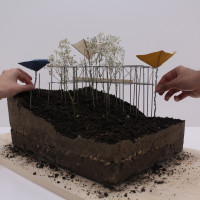Azra Akšamija, Ph.D. is an artist and architectural historian. She is an Associate Professor in the MIT Department of Architecture, where she directs the Art, Culture and Technology Program as well as the Future Heritage Lab. Akšamija’s artistic practice and academic research explore how social life is affected by cultural bias and by cultural destruction within the context of conflict, migration, and forced displacement. Akšamija authored two books, Mosque Manifesto: Propositions for Spaces of Coexistence (2015) and Museum Solidarity Lobby (2019), and edited the volume Architecture of Coexistence: Building Pluralism (2020) and Design to Live: Everyday Inventions from a Refugee Camp (co-edited with M.Philippou and R. Majzoub, 2021). Her artistic work has been exhibited in leading international venues, including the Biennials in Venice, Liverpool, Valencia, and Manila, Museums of Contemporary Art in Zagreb, Belgrade, and Ljubljana, Sculpture Center and Queens Museum of Art in New York, the Royal Academy of Arts London, Jewish Museum Berlin, Design Festivals in Milan, Istanbul, Eindhoven, and Amman. Most recently, her work has been shown at the Venice Biennale of Architecture 2021. Akšamija holds two master’s degrees in architecture from Graz Institute of Technology (2001) and Princeton University (2004), and a Ph.D. in history, theory, and criticism in architecture from MIT (2011). She received the Aga Khan Award for Architecture in 2013 for her design of the prayer space in the Islamic Cemetery Altach, Austria, the Art Award of the City of Graz in 2018, and an honorary doctorate from the Montserrat College of Art (2020).
Quick links
Syracuse Architecture
- home
- school
- programs
- admissions
- people
-
resources
- Resources
- Academic Advising
- Calendar
- Career Services
- Lecture Archive
- Library Services
- Living Learning Communities
- Lou Kearns Supply Store
- Room Availability
- Scholarships
- Student Organizations
- Technology
- alumni
Azra Akšamija
201 Slocum Hall
Syracuse NY 13244
(315) 443–2256
Contact Us
school
programs
admissions
people
resources
- Resources
- Academic Advising
- Calendar
- Career Services
- Lecture Archive
- Library Services
- Living Learning Communities
- Lou Kearns Supply Store
- Room Availability
- Scholarships
- Student Organizations
- Technology












